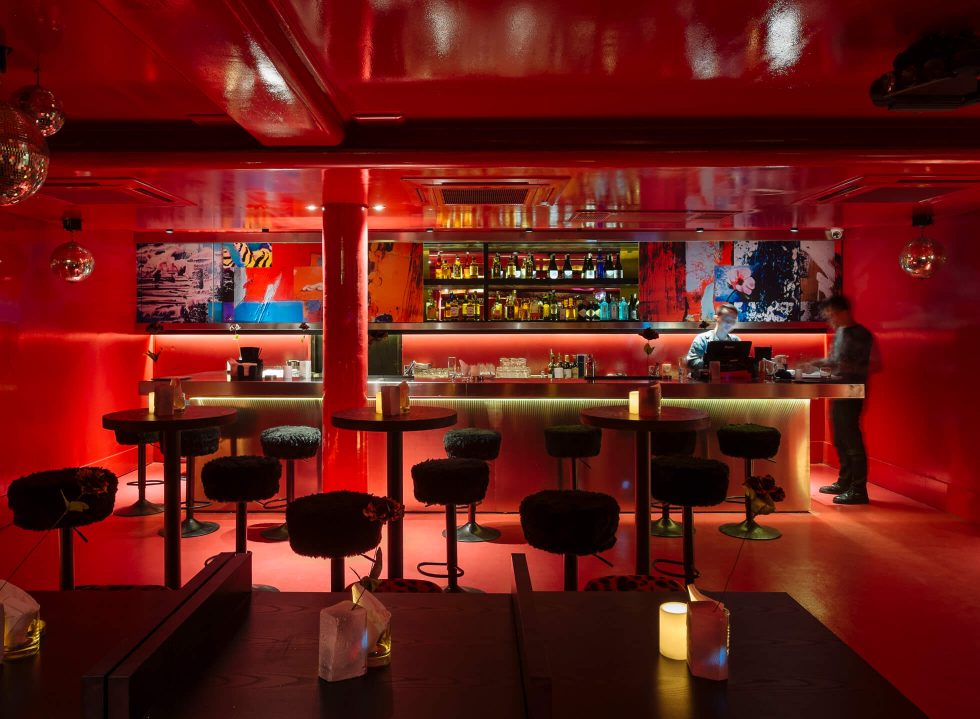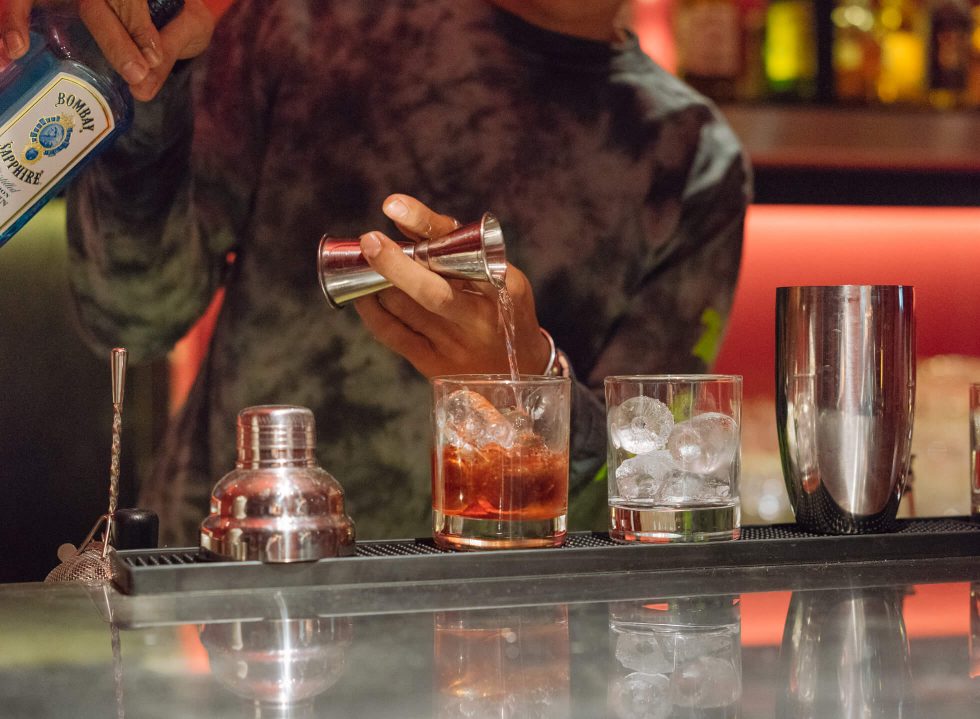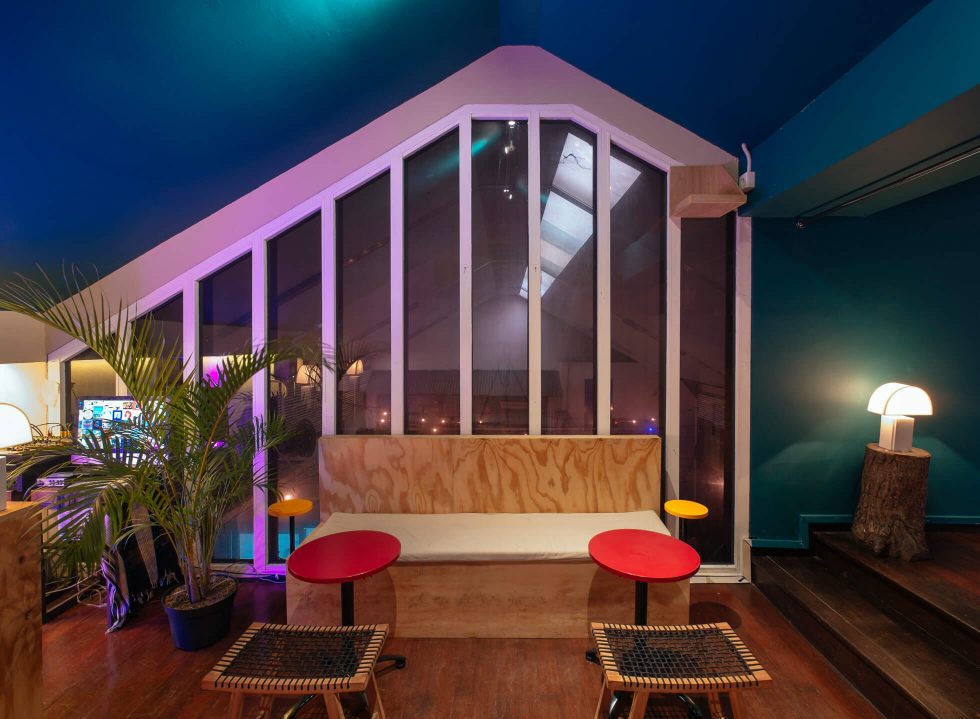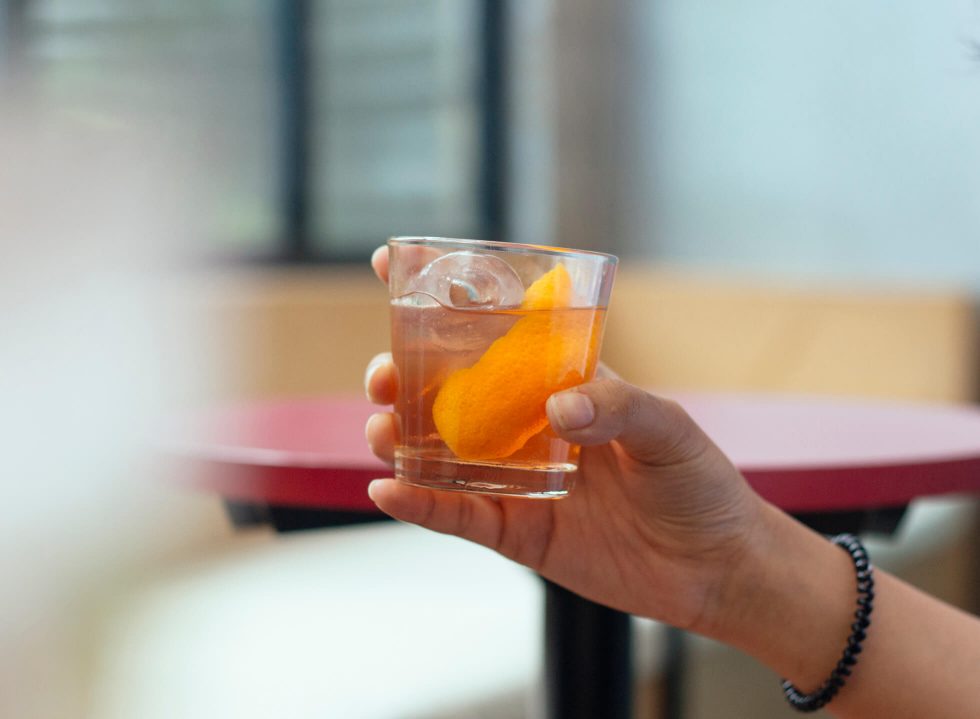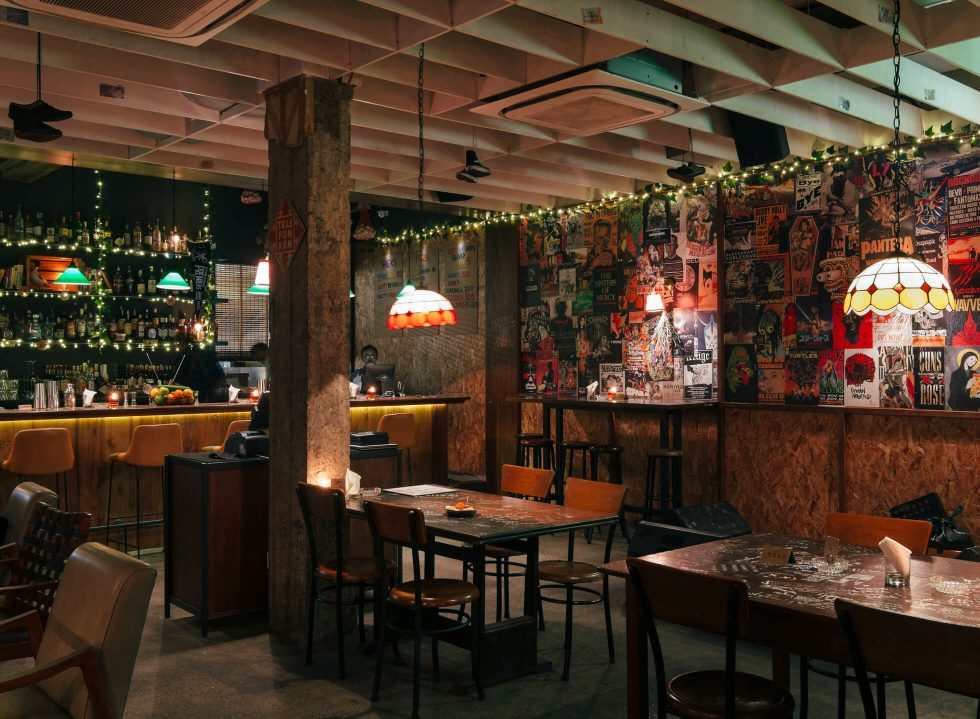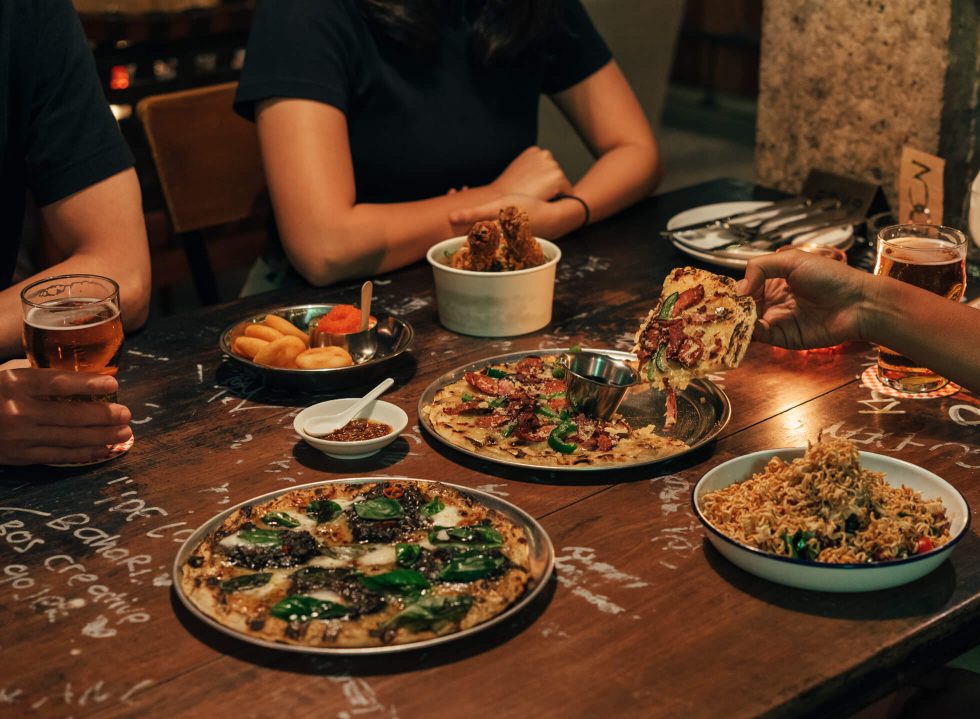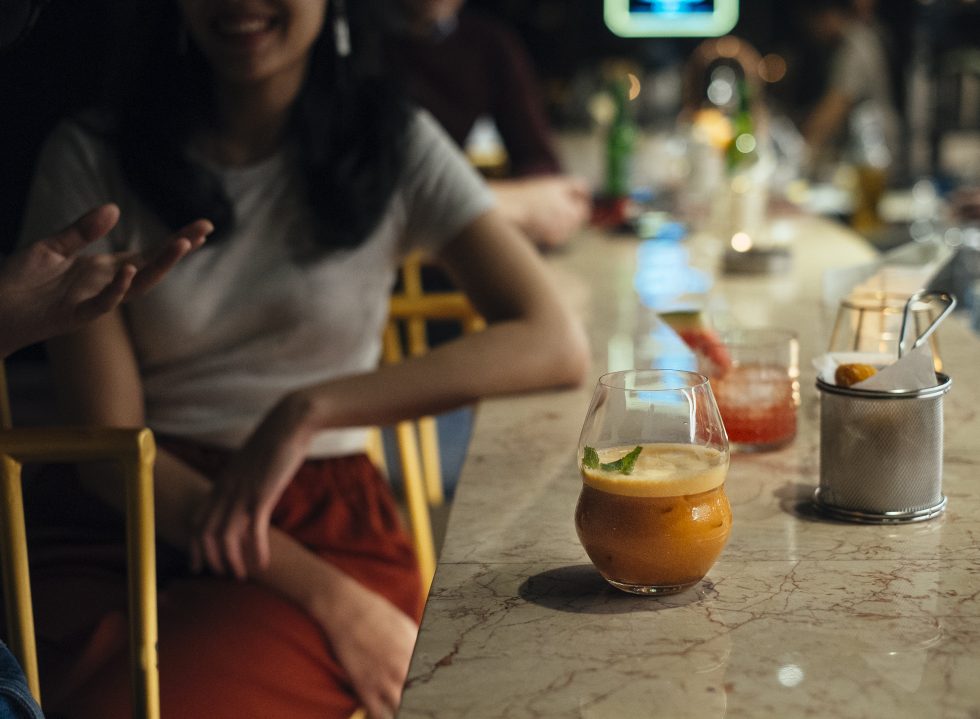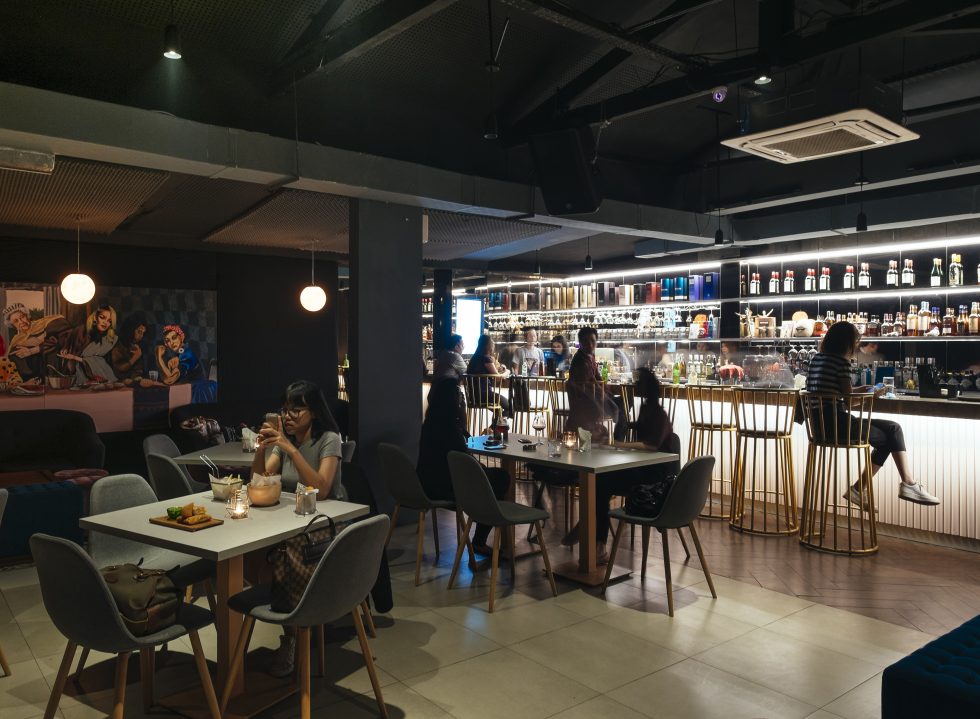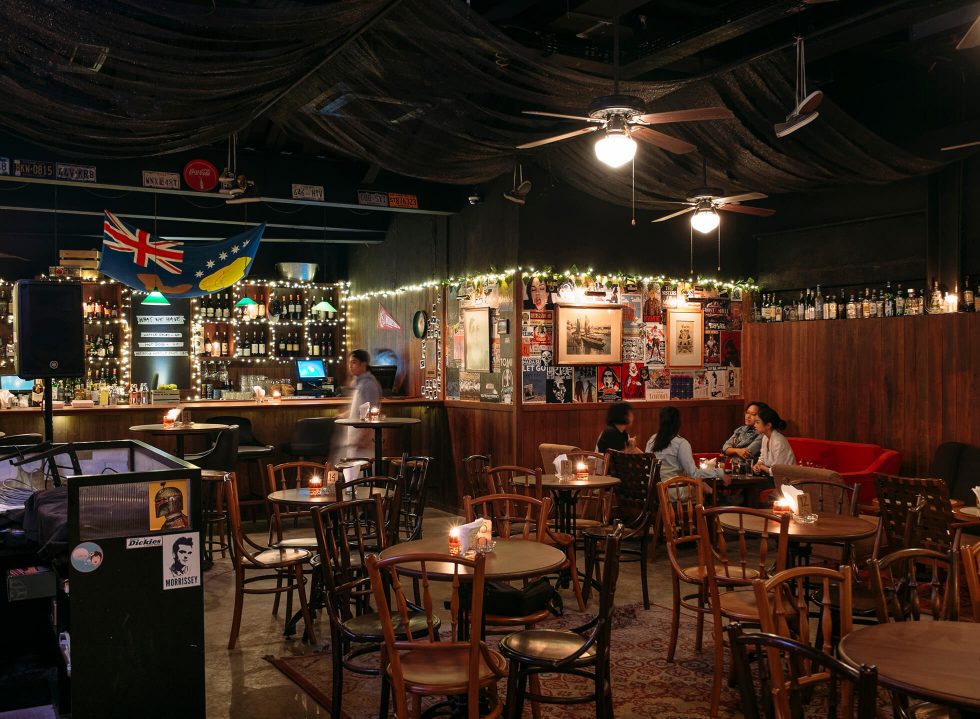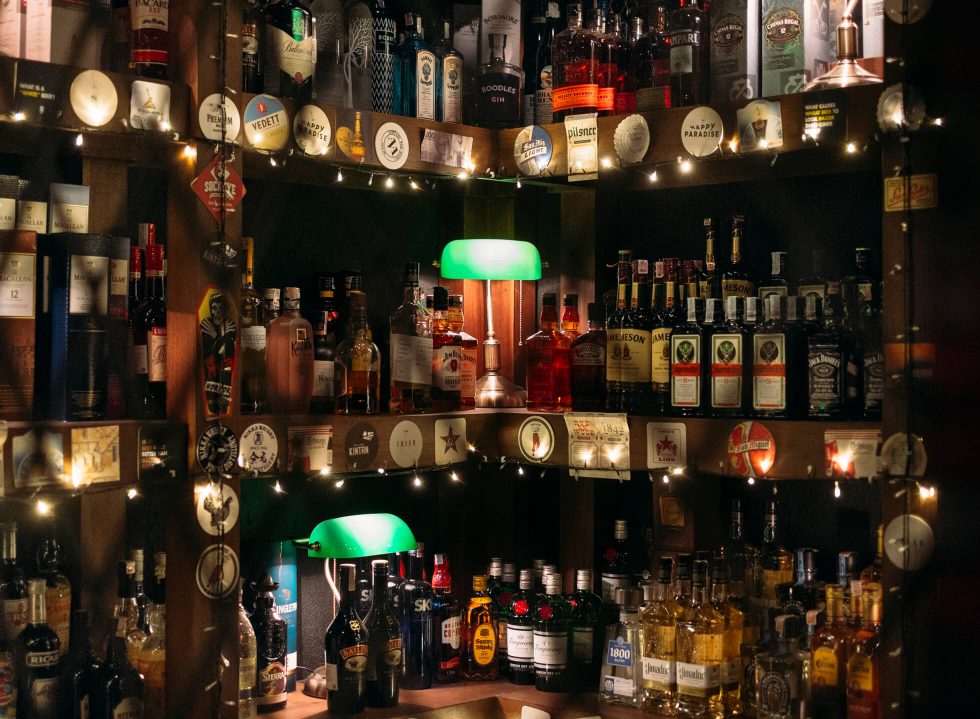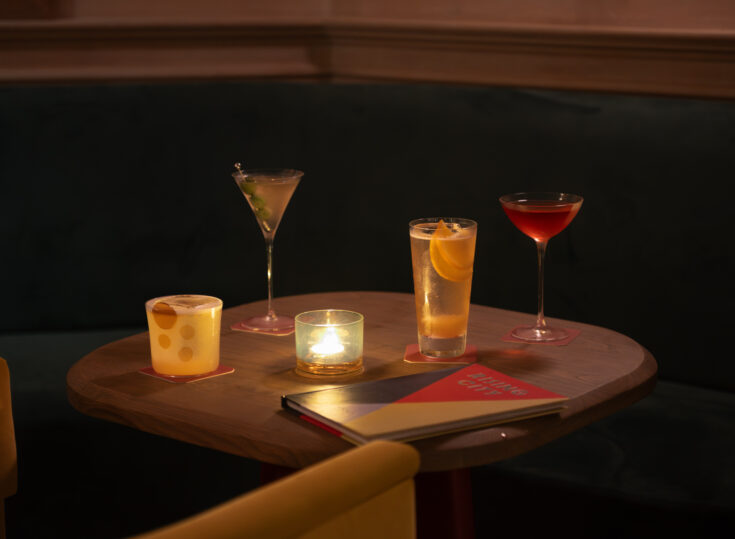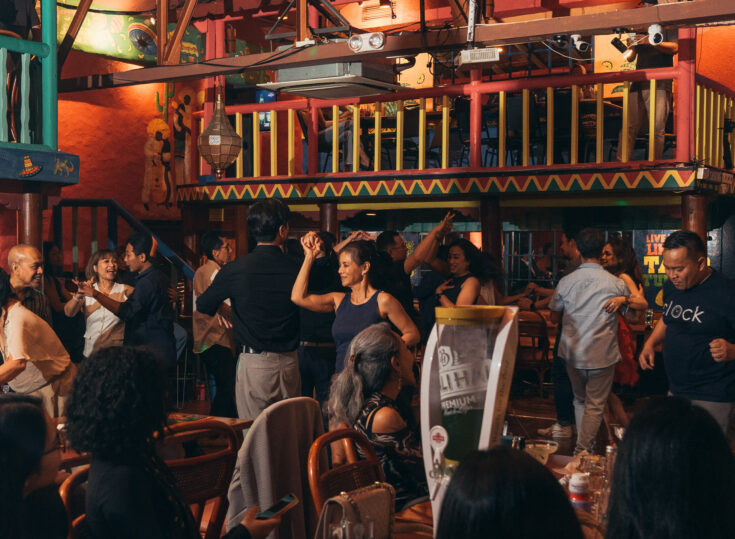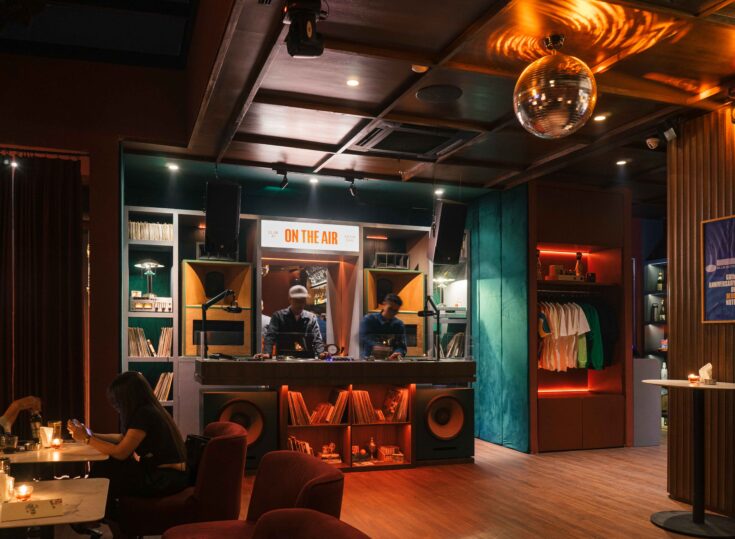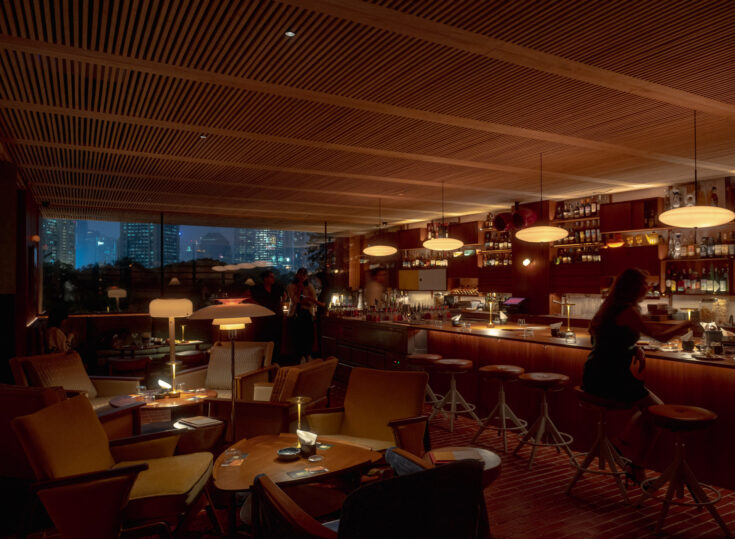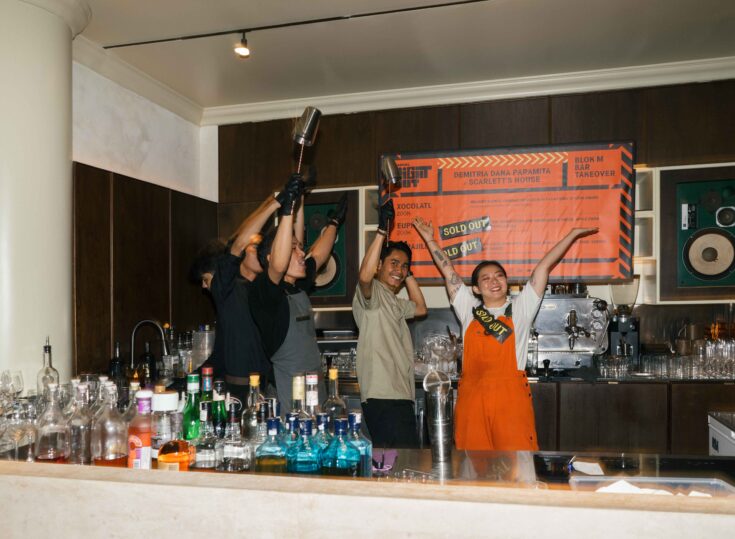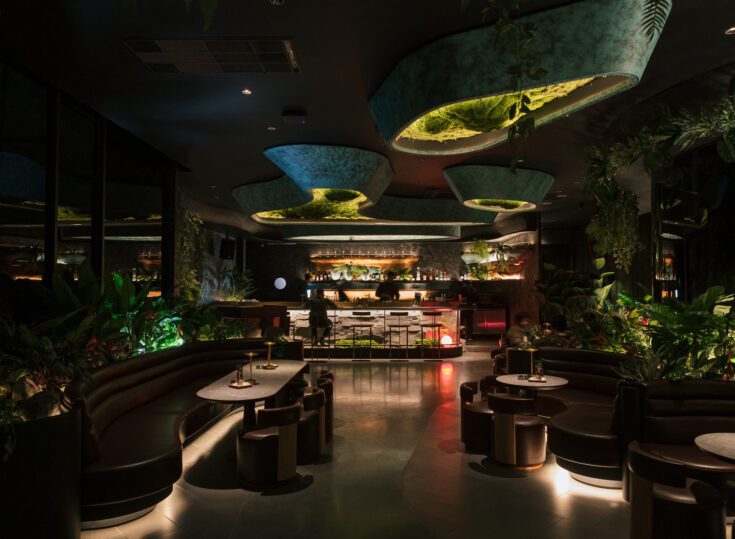Pelaspas Dharmawangsa compound is half-deserted despite the early hours into the night. Staff who work at the establishments, some still in their waiter uniform, wind down after a day’s work; the buzzy Pelaspas is ready to rest for the night. But not Slits. At the back of the compound, a huge hole of an entrance reveals a discreet flight of stairs that leads to the micro bar.
The bar is barely the size of a one-bedroom apartment, yet it’s packed with patrons going about their leisure, unperturbed by the throng. The DJ is playing funk to an odd mix of people: normcore-dressed youth, batik-clad executives, streetwear dudes, among the few. It’s a full-house on a Tuesday.
Slits isn’t alone to the picture. There’s a brand new strain of nightlife fix for denizens of Jakarta lately, where the music is vast, the tipples are curated, and most of all, bringing with it an ambience so intimate it echoes a house party.
The revival
For years, Jakarta has been a hopping hotspot for some nocturnal amusement. Throughout the last several decades the city’s nightlife spots have adopted varying models with inventive gimmicks adjusted to capture the zeitgeist. Take for instance Jakarta’s bars today which take up a melange of types: rooftop bars, pubs, lounges, speakeasies, beer gardens, to mention a few.
According to Night and the City: Clubs, Brothels and Politics in Jakarta, a 2015 study by Jérome Tadié and Risa Permanadeli, bars in Jakarta have come a long way since its earliest form during the Dutch colony. Only in late 1960s under the rule of Governor Ali Sadikin, and following the “opening of the country to foreign capital”, did night-time establishments begin to reorient themselves into a more internationalised form of leisure with a modern concept. These so-called ‘modern’ bars, clubs and discotheques were more concentrated in the Southern part of Jakarta, and this topographical tendency persists until today.
These days, however, booze, dance floor and banging Top 40 music simply don’t cut it for Jakarta’s youth anymore. They’re looking for something unfussy, outlandish, and above all, genuine.
Unforged congeniality
“Slits is rather ‘homey’ for a bar,” says Jennifer Liviana, 24, who works as an account executive in a local agency. “They’ve got a simple interior, reasonably priced drinks, and I just love the ambience.” It’s Jennifer’s first visit to Slits with her friends and she’s already keen to return.
“We created Slits to be a hidden, hole-in-the-wall space. And we’d like people to come here without feeling intimidated. We don’t want to be pretentious and be a ‘luxurious’ space. The goal is simply to get people to feel comfortable,” says Co-Founder of Slits Heru Kartowisastro or more widely known as DJ Heru K. Along with his brother, Dito, and a group of friends, he started Slits in November 2018.
Aside from music, a defining characteristic from Slits that separates it from other bars, is how the air is thick with warm conversation and congenial atmosphere. Indeed, with a space this small, customers rub shoulders with one another and conversations start easily among strangers.
Upon hearing the word “hole-in-the-wall”, perhaps one would conjure a mental picture of a gloomy and seedy bar; but Slits is different. Their house cocktails are gourmet-class concocted lowballs – their version of the Japanese highballs – with unusual names taken from the founders’ favourite songs, bands and cult movies like Mammagamma and Raising Arizona. One, Ume Says, a mix of plum liquor and club soda garnished with dill leaves, is a type of tipple one wouldn’t expect in micro bars like Slits. And unsurprisingly, it’s the drink that hooks the patrons in an instant.
While beer remains the in-demand beverage in bars, yet more and more customers are open to try different things. A 2018 study by the World Health Organization found that the amount of Alcohol per Capita consumption (for ages 15 and above) in Indonesia has steadily increased. It’s a boon to small bars like Slits, and an assurance for them to put a lower price tag on their cocktails in their mission to embrace more customers.
“People don’t have to think twice when buying our cocktails. In most other bars, usually you’re either have a can of beer or buka botol (an Indonesian slang which means to share an expensive bottle of spirits and mixers with friends). You can do that anywhere as long as you have the money, but we don’t want to do that here,” says Heru.
Curated beats
But good drinks alone won’t suffice to maintain Slits’ clientele. With the DJ deck smacked right next to the bar, it’s a statement of its own: music and drinks are Slits’ number one priorities.
Slits’ penchant for audio dates back to a few years ago. Having established Taco Local and Bao Ji at Pelaspas a few years back, Heru, Dito and co-founders of both eateries saw a potential space on the second floor of the building. Immediately, it became an informal HQ, called UP, which developed into a space where newbie DJs test drive their music. UP was a training ground for them whilst receiving a handful of niche customers.
Years later, Slits replaced UP. But the bar’s eclectic soul persists. Putra “John” Fadhil spins every now and then at Slits under the moniker DJ Artificial. He’s been a guest DJ at Pelaspas’ tenants since 2015, and has since been recruited to develop Slits’ music department. The bar’s playlist is extensive: On some nights they play funk, soul and house; on other nights, folk, groove and dub. All DJs are privileged a long set time and sometimes all night long. “This is a rare opportunity for DJs. Usually in events, they can’t really express their music styles due to time constraints,” John adds.
First experience does matter, according to Kevin Wiyarnanda’s story upon his first visit to Slits. He feels that Slits’ music seems to round off the atmosphere. “The tunes really complement the whole vibe too, as well as the interior design and the drinks. It gives the establishment its own identity,” says Kevin who works as PR and Media Relations Officer at a lifestyle group in Jakarta.
Billboard chart music and Electronic Dance Music may still find a strong foothold in bigger, older establishments, yet lesser-known music subcultures thrive in these pocket-sized bars.
Pioneering the movement are music collectives that make these bars alive. Slits is one of them. Aside from being an entrepreneur, Heru K is one of the co-founders of Sunset People Project, a well-known local DJ collective with their sought-after gigs. And as we know, he got assisted by DJ Artificial, who represents a music collective and record label called The Talking Machine.
Elsewhere there’s Pleasure, one of the most acclaimed music collective whose gigs are always packed with revellers, both in Jakarta and abroad like Japan. Zodiac, Pleasure’s owned newly-established music bar, is the epitome of their ambition as a music collective: their own space that comes packed with “proper lighting and sound system” where they can hold parties and spin their music to heart’s content.
Zodiac sits on Senopati Street, one of the main lifestyle spots in Jakarta. Though it took up a space of a former parking bay, location-wise it is unmistakably conspicuous with its huge signage. Scarlet walls, leopard-print couches and grabbing visuals, Zodiac’s interior with all its stylish kitschiness concept has been the photogenic darling of Instagram users.
Indeed, with audiophiles at the helm, Zodiac’s music curation is undoubted. Each day has its own music theme, from disco to blues, to which all the DJs are required to follow.
“Our Tuesday’s Jazz Night is always packed. On that day we play a mix of jazz, blues and pop. Although there’s a theme for each day, it comes down to the DJ to play the sets [according to their taste],” says Pleasure’s Co-Founder and Zodiac’s Finance Director Narendra Tanaya, also known as DJ TARA.
Thanks to this theme carousel, Zodiac attracts diverse types of customers, reckons Pleasure’s Co-Founder and Zodiac’s Creative Director Michael Killian. “Pleasure is all about fun. That’s why we don’t want our music to be specifically boxed [into a certain genre]. Even though we largely play disco and house, those who come aren’t only people who are into these genres. We have different types of customers every night and it’s good because it means our community grows larger,” says Michael.
Michael, who is also the Creative Director of Slits, says that sometimes Zodiac also welcomes non-DJ musicians to man the deck. Once, they invited jazz musicians Nikita Dompas and crew to debut as a guest DJ. Last month, it was pop band White Shoes and The Couples Company’s turn to take over the beats.
Powered with suave audio equipment that gets musicians drooling (“Our Bozak mixer is a rare piece. Meanwhile our speaker is Vintage Altec, the pride of Zodiac,” says Narendra), Zodiac is geared for an aural-pleasing experience come weekdays or weekends.
Still, while good music keeps customers coming, the intensity of its volume is often the point of complaints.
“I think it’s very important for bars that I visit to have that quality of not being too loud and rowdy,” Kevin admits. “I would like to go to bars where I could still talk to my friends and having a decent conversation without having to shout at each other.”
Jennifer concurs with Kevin. One of her criteria for a post-work leisure, is a venue where she can relax and chat with friends. “The music must be at the ‘right’ volume [that can be enjoyed] and not deafening for sure, therefore, allowing us to converse,” she says.
Thankfully, it’s something that has been taken into consideration by both owners of Zodiac and Slits. After all, both venues are founded by audiophiles, making the pleasure of song-listening a priority. “Most of our customers are here mainly to hang out, chat, and socialise. Our small space accommodates that sense of intimacy,” says Dito, co-founder of Slits.
Against the norm
Duck Down Bar is one of the few bars that upend the norm. A newborn from lifestyle company Biko Group – who is also behind LoLa, Fujin and Mother Monster – Duck Down Bar is an American-inspired dive bar that plays rock and roll and guilty pleasure music. You’d find posters and crude graffiti all over its walls. It’s the kind of drinking den where getting plastered is common and “all the formality vanished”.
Founder Mikael Mirdad has been in the business for almost 10 years. “All players [in F&B business], including us, have been relying on the same trend over and over again. It’s become monotonous.” He details how EDM playlist, ‘posh menu’ the like of truffle uni and foie gras, attractive interior, were the hype in recent F&B establishments.
“It wasn’t fun anymore. And then came the idea to create a place where all the stereotypes above are turned upside down: we don’t need an expensive interior, we don’t need gourmet food and fancy cocktails, and we don’t play EDM and R&B songs. Duck Down Bar is the output,” he says.
The bar’s concept is created based on the type of place that Biko Group’s team are looking forward to come to after an exhausting day at work. Even the playlist consists of “guilty pleasures” that they listen to at work and home. The result is their weekly karaoke gigs, each hosted by creative figures from various industries such as graphic design studio (designer Eric Widjaja of The Thinking*Room was one of them), publishing company (Manual Jakarta team also led one), artists, and so on.
Before its opening, Mikael’s biggest worry was people’s reception towards the mishmash of music, “How would people react when you put on Britney Spears right after Metallica?” he quips. But immediately, people went mad for their karaoke night. Every session sees immersive carouses, overpacked with a merry crowd singing along to Evanescence, Reza Artamevia, Linkin Park, and tons of other titles of the nostalgic 80s-90s era.
Between singing breaks, patrons help themselves to Duck Down’s beer list, peanuts, waffle fries, or hot dogs. “Our hotdog is inspired by 21 Cineplex (biggest local cinema chain),” Mikael laughs. “And our idea for drinks are those that we drank during our college years.”
Before long, Biko gave birth to Duck Down’s sibling, Duck Down Pizza Party in Kemang. The latter still hinges on the similar concept, with the addition of a pizza menu created by Singapore’s award-winning chef, Bjorn Shen.
Wild and brazen though they are, their hidden quality lies in the frankness that savvy places may lack. They’ve outsmarted competitors by relying on deft humour and gaiety as the main tonic for customers.
Embracing new market
The concept of a late-night hive has evolved overtime. The ease of social media and travelling have exposed Jakartans to international trends that have gotten hold in Europe, the United States, Australia, and other parts of Asia such as Japan and Singapore. City dwellers have started to be more open towards the activity of drinking alcohol, dancing and partying. They’re no longer associated with delinquency, nor considered disreputable.
However, there’s no denying that several stereotypes remain, especially when it comes to gender. As it transpired, the current nightlife biz is still dominated by male, and subsequently tailors – perhaps, unwittingly – to men in general. One may have lost count of the number of bars that adapt “manly” themes; from the posh gentlemen lounge to brooding pubs.
But this is no longer the case as the number of women’s alcohol consumption in Jakarta is slowly catching up to men’s. WHO’s Global Status Report on Alcohol and Health stated that the prevalence of female’s alcohol consumption has increased in South-East Asia region despite the decline in most parts of the world such as in Europe and America’s regions.
Jennifer, for one admits that she could go to a bar nearly each week. Aside from hanging out with friends, her purpose of going to bars is for the drinks. “When I’m looking for a place to drink [alcohol], it’s more due to the curiosity of trying out different types of drinks. I’m not going to bars to get smashed, that’s for sure,” she says.
“It’s still considered taboo for girls to go to bars and drink alcohol,” says Ignacia Bella. Ignacia Bella along with her high school friend Claudia Belinda Mulia and two other female partners own Bar Gina, the first feminist bar in Jakarta. The bar was opened in October 2018 and is located in the same neighbourhood as Duck Down Bar and Zodiac.
“So what if girls go out late? That’s why we created this place specially for them who feel the social pressure of being a female,” says Claudia. Both former bank executives, Claudia and Bella share similar passion in cocktails. Whenever they go abroad for a vacation, bar-hopping is on top of their list. One of the most memorable bars from their salad days is Bar Moga in New York City, a 1920’s Japanese-inspired bar, that is not only owned and operated by females, it also boasts a wine list from female winemakers all over the world.
Bar Moga’s female’s empowerment spirit drove Claudia and Bella to start Bar Gina. On one side of the wall, a huge rendition of Leonardo da Vinci’s The Last Supper – with “goddesses”, Beyonce, Angelina Jolie, Frida Kahlo, Yayoi Kusama, Lisa Simpson, among the few, replacing Jesus and the 12 disciples – is a clear statement of their Girl-Power-charged venue.
“Even though we’re calling it a feminist bar, it’s more towards supporting gender equality and inclusivity. We’re very open to anyone,” says Claudia. “Yes, 60 to 70 per cent of our customers are mostly females. They feel comfortable [to be unreserved] here. Wouldn’t it be irritating to be in a bar and get harrassed and catcalled?”
The GRL-PWR attitude extends to the drinks list, where Bar Gina’s cocktail recipes are largely made by Claudia and Bella. “We did the trial at my house and asked my mum to test our recipes. It was fun,” she laughs. Of course, the fun part was not due to making her mother tipsy. Rather, the country’s limiting regulations of alcohol import has pushed them to get creative.
“It was tough at the beginning because it was hard to get certain spirits and liquors. That was when we created our homemade syrup for most of our cocktails. We create spirits infusion too,” Claudia explains. Bar Gina’s best-sellers? Of course, their cocktails, which are mostly herb-infused and steeped in fruity flavours.
A more apparent practice of their feminist optimism is the array of women celebration events that they hold. The Diva Night karaoke session runs every week, themed with a tribute to female songstresses like Beyoncé and Indonesian divas; Raissa, Krisdayanti, Titi DJ, and more. On Women’s Day, they gave out cheeky Boobies Sugar Cookie to customers. The vibe is lively, energetic, and strangers are mostly blending in. Their feminist theme crops up to be an effective conversation starter between customers.
Promising outlook
Despite the brutal nature of lifestyle business, this crop of new bars is rejoicing over the revival of Jakarta’s nightlife.
“I’m super happy to see these new bars arriving. Zodiac, for instance, was started by [audiophiles] who are so passionate about their music. They channel this love for music through their medium, which is their concept music bar. In the future there will be more people [like them] with different passions who arrive in the industry and start something that suits their personality,” Mikael opines.
This goes to show that Jakarta’s lifestyle players have ideas brimming out of their heads to recreate a nightlife experience in the city. Gone are the days of the monotonous bar scene you see as the sun sets. Establishments who brace unique concepts and memorable identities now stand out to revive an uninspired nightlife scene that plagued Jakarta once. And so long as this spirit lives on, Jakarta’s nocturnal pulse will continue to beat.
